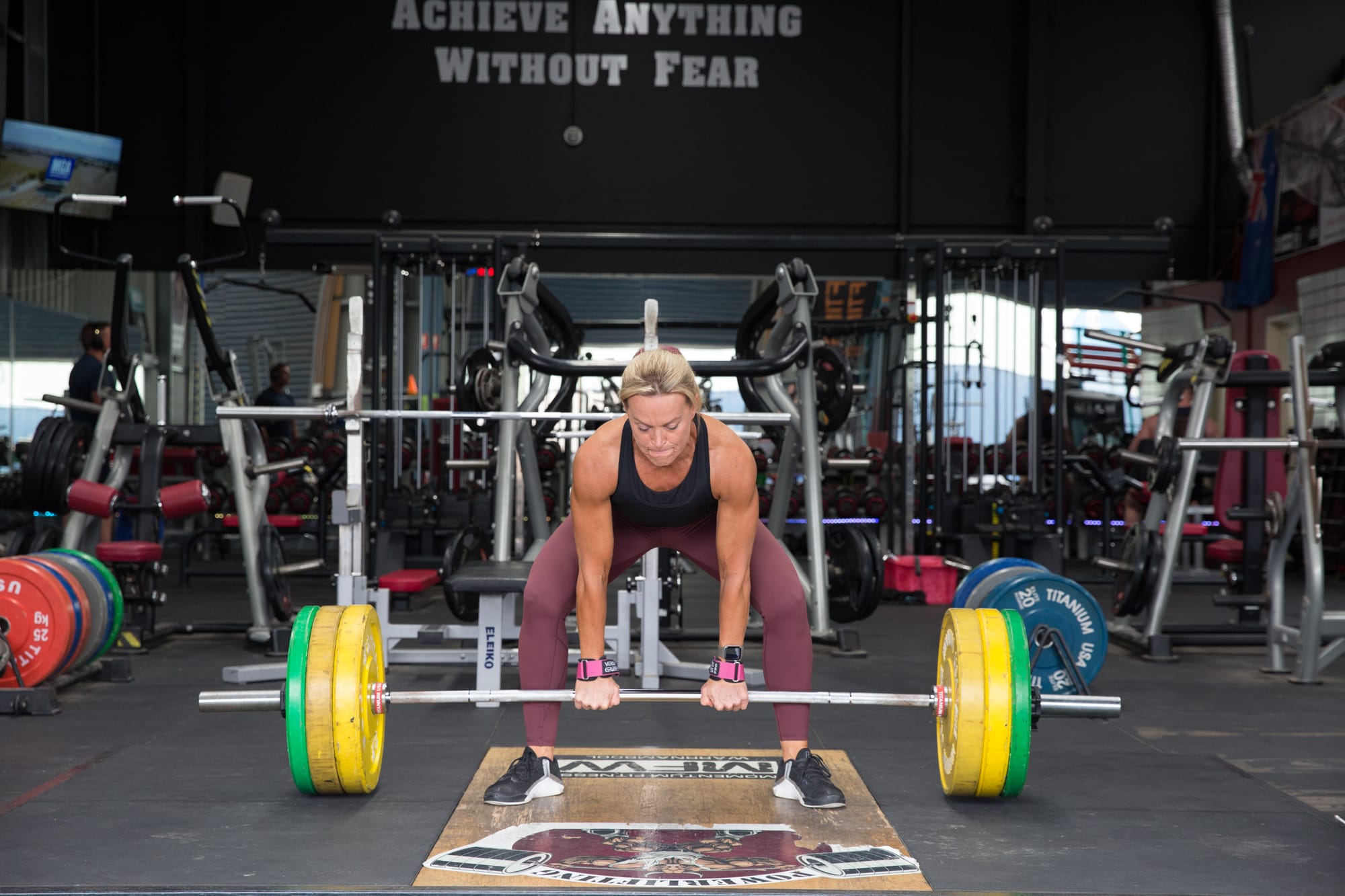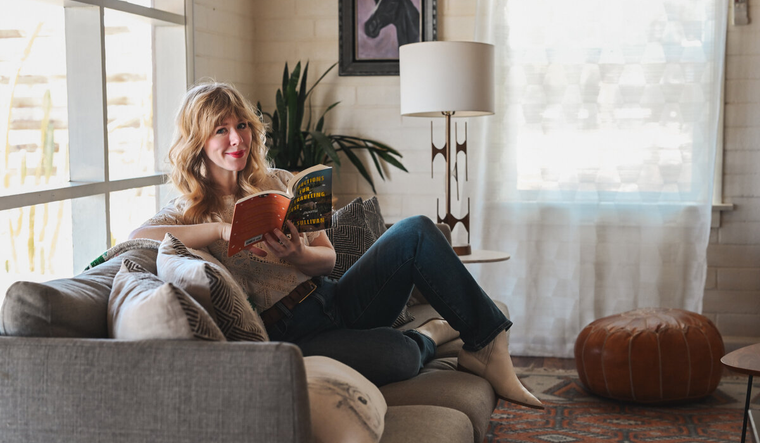It’s Never Too Late to Start Lifting Weights—and Trainer Tania Monk Shows Us How to Get Going
If it seems like everyone is talking about the benefits of strength training these days, it’s because they are. From bestselling health books and news headlines to conversations among your family and friends, lifting weights is a hot topic.
This is for good reason: Strength training offers a long list of health benefits, from increased muscle and bone mass and improved body composition to better posture and balance, hormonal balance, and a mood boost. New research even proves that these benefits are on offer no matter your age: In a study of people age 65 and older who’d never regularly weight trained before, every participant responded powerfully to lifting weights three times a week for 12 weeks—proof that it really is never too late to start lifting.
If you’d like to get into a regular strength training routine—but you’re not exactly sure where to start—read on. Tania Monk, an Australia-based personal trainer and founder of Fit After 40, shares her thoughts on why strength training is crucial when it comes to aging well, her No. 1 piece of advice for getting started, and more.
A CONVERSATION WITH TANIA MONK
The research is clear: Strength training is one of the best things all of us can do, and especially women, when it comes to increasing our healthspan. Why is this?
Everyone agrees strength training is one of the best things that can help you improve not only your longevity, but the quality of your life as well. And finally, women are getting the message that it can be especially helpful in mid-life, particularly during the menopause transition. Women used to focus on cardio because that's what we were told to do: Burn more calories, eat less. Now, we know better.
In mid-life, women start to lose strength and power at an alarming rate. And one of the most important steps you can take to counter this is to start strength training.
For those who want to get started lifting weights, what’s your best advice?
You want to follow a progressive program that focuses on building strength over time. Start with the basics, do the basics well, and then work your way up.
If possible, it’s great to work with a personal trainer. They can help you with your exercise form and ideally, they’ll create a program for you that progressively challenges your muscles. Once you have a solid foundation, you want to make sure you’re pushing yourself safely over time. A lot of people will go to the gym and lift the same weights for the same amount of time. But you need to challenge your body if you want to get stronger. As the saying goes, “What you challenge, changes.”
If you don’t have access to a personal trainer or can’t afford one, there’s actually a lot you can do using your own body weight or standard at-home gym equipment. However, I would encourage you to have a plan. Knowing what to do—and when to do it—can be challenging, especially considering the sheer volume of information out there. It can be tempting to either improvise your workouts as you go or stick to the same-old familiar routines. Whether with a trainer or not, it’s important to create a plan that will take you step-by-step from where you are today toward your ultimate goal. This will tee you up to get the best results possible out of your available time.

I still see so many more men than women in the weight room. What’s the best way to overcome weight-room intimidation?
A lot of women are afraid to venture out of the cardio area of the gym. I have a lot of female clients who lift at home, and that's fine. But I also believe that being in an environment where people are lifting is encouraging and contagious. And I really do want to empower women to be able to walk into any gym and start lifting.
This is another reason why working with a personal trainer—either in person, or virtually—can be so helpful. A personal trainer will give you a clear plan, which can help you have the confidence you need to walk into the weight room and know what you’re doing.
Enlisting a friend or finding a group of people to lift with can also help make the weight room at your gym feel less intimidating.
It’s also important to know that you may not always feel like lifting weights. Getting on the treadmill or exercise bike can feel easier, because you can just zone out while you’re on those machines. Lifting takes focus, and it can be really challenging. But there’s something to be said about stepping outside your comfort zone.
Do you still hear from women who are afraid to lift because of fears that they’ll get too “bulky”?
All the time! This is such a huge concern for women. But here’s the truth: It's almost impossible for women to get bulky from lifting weights. For the majority of the general population, lifting will encourage muscle growth and bone strength, and leave your physique more defined and leaner—not bulkier.
I think the more we can focus on strength training as a route toward being healthy, strong, and energized, the better.
What’s your best advice for actually sticking to a new strength-training regimen?
When you first start tackling a new goal, it’s normal to be excited and make big plans to do everything all at once. But that can be a recipe for burnout, frustration, injuries, and failure. Instead, come up with a realistic plan that works with your lifestyle and that you can follow even when your schedule is busy.
Motivation is awesome when it strikes—but the truth is, it comes and goes for everyone, even for the most motivated people. This is the point at which discipline must assume control, because motivation tends to arise only after an action has been initiated. When you stay true to your commitment, something truly remarkable unfolds: Your motivation soars! With time, your dedication will pave a smoother path forward.
Can you speak to the importance of setting goals when starting a new strength-training regimen?
I help my clients focus on small, incremental changes—what I call process goals—that ultimately pave the way for achieving significant outcomes, or outcome goals. These outcomes are not just achievements, but integral steps towards living the life that resonates with the person you aspire to be, all while staying aligned with your core values.
Process goals are the small steps you take to reach your big goal, like exercising every day or eating healthier. Outcome goals are the big results you want—for instance, losing 10 pounds or running a marathon. Core values are the important beliefs and principles that guide how you act, make decisions, and treat others.
It’s important to set process and outcome goals for yourself—and then hold yourself accountable for meeting them. Your results will be a reflection of your actions over an extended period of time, not just one day or one week here and there.
I also think it’s crucial to know that you will have setbacks. It’s what you do after the setback that counts. So, instead of waiting for a setback to happen and then letting it derail you, plan ahead. Ask yourself right now: What will I do if I miss a workout or two (or five!)? Here’s a hint when it comes to how you’ll answer: I’ll restart as soon as I possibly can! The same goes for any dietary changes you make. Decide now that you will get back on track ASAP. Expect the unexpected, and don’t let it kick you to the sidelines.
Tania Monk is a fitness and nutrition coach in Victoria, Australia, and founder of Fit After 40. To learn more, visit fitafterforty.com.au.
Please note that we may receive affiliate commissions from the sales of linked products.



